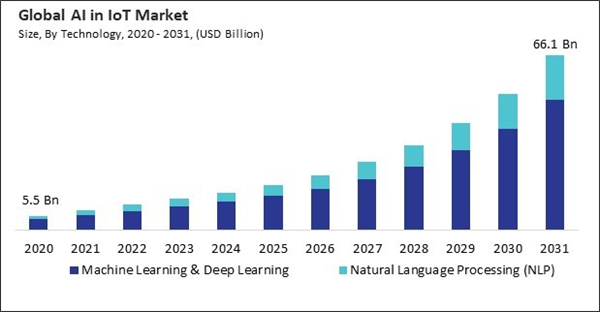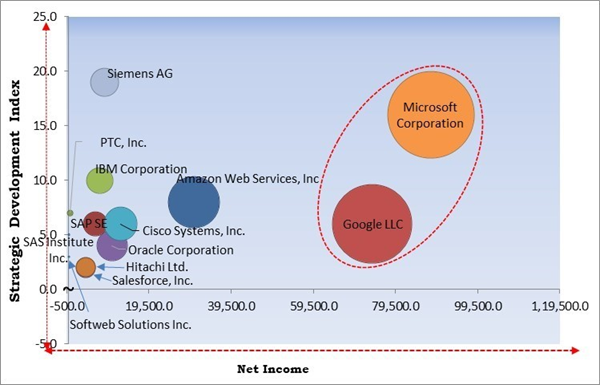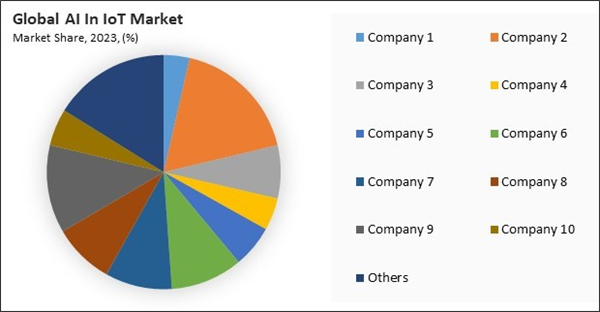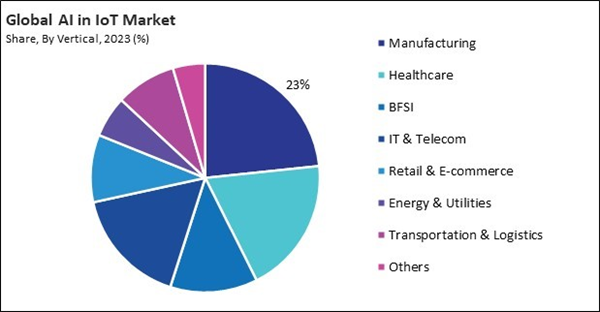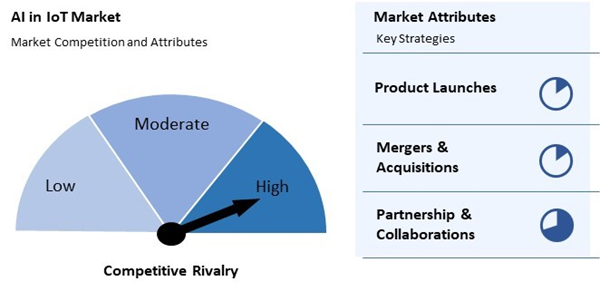AI in IoT enables collecting and analyzing customer behavior data from various touchpoints, such as online browsing and in-store interactions. This data helps deliver personalized product recommendations and promotions, enhancing the shopping experience. IoT devices like smart mirrors and interactive kiosks powered by AI can provide personalized product suggestions based on customer preferences and previous purchases, leading to a more engaging and customized shopping experience. Thus, the retail & e-commerce segment procured 10% revenue share in the AI in IoT market in 2023.
The major strategies followed by the market participants are Partnerships and Product Launches as the key developmental strategy to keep pace with the changing demands of end users. For instance, In 2024, August, AT&T’s IoT connectivity and network APIs will integrate with Oracle’s Enterprise Communications Platform (ECP), offering Oracle’s industry cloud clients a unified way to manage IoT devices on AT&T’s network. This solution simplifies management by combining IoT edge application management with seamless network connectivity. In 2024, Microsoft Corporation teamed up with Lumen Technologies, a publicly traded company specializing in telecommunications and technology services to enhance Lumen's digital transformation using Microsoft Cloud. Microsoft will leverage Lumen’s network to support increased demand for its AI-driven data centers. This collaboration emphasizes both current and future network infrastructure to support a wide range of workloads and empower global organizations.
Cardinal Matrix - Market Competition Analysis
Based on the Analysis presented in the Cardinal matrix; Microsoft Corporation and Google LLC are the forerunners in the AI In IoT Market. Companies such as Amazon Web Services, Inc, Oracle Corporation, Cisco Systems, Inc. are some of the key innovators in AI In IoT Market. In July, 2024, Microsoft Corporation teamed up with Lumen Technologies, a publicly traded company specializing in telecommunications and technology services to enhance Lumen's digital transformation using Microsoft Cloud. Microsoft will leverage Lumen’s network to support increased demand for its AI-driven data centers. This collaboration emphasizes both current and future network infrastructure to support a wide range of workloads and empower global organizations.Market Growth Factors
AI integration with IoT enables the automation of workflows, optimizing tasks such as inventory management, predictive maintenance, and quality control. This leads to faster and more accurate execution of tasks, enhancing overall operational efficiency.Additionally, Devices can automatically detect issues and provide immediate solutions or alerts to support teams, leading to faster resolution of problems and improved customer satisfaction. Thus, the growing need for real-time data analytics propels the market's growth.
Market Restraining Factors
Organizations may need to employ or contract professionals with advanced skills in AI, data analytics, and IoT technology. The cost of hiring and retaining such talent can add to the overall maintenance expenses, further increasing the total cost of ownership. Hence, high implementation and maintenance costs are impeding the market's growth.The leading players in the market are competing with diverse innovative offerings to remain competitive in the market. The above illustration shows the percentage of revenue shared by some of the leading companies in the market. The leading players of the market are adopting various strategies in order to cater demand coming from the different industries. The key developmental strategies in the market are Partnerships, Collaborations & Agreements.
Driving and Restraining Factors
Drivers- Rising demand for automation and efficiency
- Growing need for real-time data analytics
- Increasing digital transformation worldwide
- High implementation and maintenance costs
- Data privacy and security concerns
- Expansion of smart cities initiatives
- Rise of 5G networks worldwide
- Complexity of AI model training
- Latency issues in data processing
Technology Outlook
On the basis of technology, the market is segmented into machine learning & deep learning and natural language processing (NLP). The machine learning & deep learning segment recorded 76% revenue share in the market in 2023. Machine learning and deep learning algorithms are highly effective at processing and analyzing vast amounts of data generated by IoT devices.Component Outlook
Based on component, the market is divided into platform, software, and service. The software segment attained 32% revenue share in the market in 2023. AI in IoT software is critical for processing and analyzing the massive amounts of data IoT devices generate.Vertical Outlook
By industry vertical, the market is divided into BFSI, IT & telecom, retail & e-commerce, manufacturing, healthcare, energy & utilities, transportation & mobility, and others. In 2023, the IT & telecom segment registered 17% revenue share in the market. AI in IoT enables real-time network performance monitoring, allowing IT & Telecom companies to quickly identify and address bottlenecks, outages, and performance degradation.By Regional Analysis
Region-wise, the market is analyzed across North America, Europe, Asia Pacific, and LAMEA. In 2023, the Asia Pacific region generated 27% revenue share in the market. The Asia Pacific region is experiencing rapid urbanization, particularly in China, India, and Southeast Asia.Market Competition and Attributes
The AI in IoT market is fiercely competitive, driven by rapid technological advancements and increasing demand for smart devices. Key attributes of the market include real-time data processing, edge computing, and advanced analytics. Major players emphasize enhancing security, scalability, and integration capabilities to meet diverse industry needs. Innovations in machine learning, data management, and predictive maintenance are critical for staying ahead. Companies are also focusing on seamless interoperability and reducing latency to improve overall efficiency and user experience in connected environments.
Recent Strategies Deployed in the Market
- Mar-2024: Siemens AG announced the acquisition of EBM-Papst, a company designing and manufacturing ventilation and drive engineering products that want to take the industrial drive technology (IDT) business to enhance its industrial automation portfolio, including mobile robots and driverless vehicles. This acquisition will allow Siemens to access new business opportunities and customers in the fast-growing market for intelligent, battery-powered drive solutions in intralogistics and mobile robotics.
- Oct-2023: Enlighted, a Siemens-owned property technology leader, has enhanced its Location Services solution by integrating artificial intelligence (AI), boosting asset tracking accuracy. This Real-Time Location System (RTLS) monitors assets and badges within buildings using Enlighted's intelligent lighting infrastructure. Additionally, two new partners have joined the Enlighted AI partner ecosystem.
- Oct-2023: Siemens AG partnered with Microsoft Corporation, a multinational technology company to enhance industries globally with generative AI. They are launching Siemens Industrial Copilot, an AI-powered assistant designed to improve human-machine collaboration in manufacturing. The partnership will also aim to expand and develop additional copilots for the manufacturing, infrastructure, transportation, and healthcare sectors.
- Jun-2023: Siemens AG teamed up with Intrinsic, an Alphabet company to integrate Intrinsic's AI-driven robotics software with Siemens Digital Industries' open automation portfolio. This collaboration aims to accelerate the use of AI in industrial robotics, leveraging Intrinsic's open approach and Siemens' expertise in automating industrial production.
- Mar-2023: Siemens Smart Infrastructure unveiled Connect Box, an IoT solution within the Siemens Xcelerator portfolio, for managing small to medium-sized buildings. This user-friendly tool enhances building performance, potentially boosting energy efficiency by up to 30% and improving indoor air quality in schools, retail shops, and offices.
List of Key Companies Profiled
- Salesforce, Inc.
- Softweb Solutions Inc.
- Amazon Web Services, Inc. (Amazon.com, Inc.)
- SAP SE
- SAS Institute Inc.
- Hitachi Digital Services, LLC (Hitachi Ltd.)
- Oracle Corporation
- Google LLC
- PTC, Inc.
- IBM Corporation
- Cisco Systems, Inc.
- Microsoft Corporation
- Siemens AG
Market Report Segmentation
By Technology- Machine Learning & Deep Learning
- Natural Language Processing (NLP)
- Platform
- Software
- Services
- Manufacturing
- Healthcare
- BFSI
- IT & Telecom
- Retail & E-commerce
- Energy & Utilities
- Transportation & Logistics
- Others
- North America
- US
- Canada
- Mexico
- Rest of North America
- Europe
- Germany
- UK
- France
- Russia
- Spain
- Italy
- Rest of Europe
- Asia Pacific
- China
- Japan
- India
- South Korea
- Singapore
- Malaysia
- Rest of Asia Pacific
- LAMEA
- Brazil
- Argentina
- UAE
- Saudi Arabia
- South Africa
- Nigeria
- Rest of LAMEA
Table of Contents
Companies Mentioned
- Salesforce, Inc.
- Softweb Solutions Inc.
- Amazon Web Services, Inc. (Amazon.com, Inc.)
- SAP SE
- SAS Institute Inc.
- Hitachi Digital Services, LLC (Hitachi Ltd.)
- Oracle Corporation
- Google LLC
- PTC, Inc.
- IBM Corporation
- Cisco Systems, Inc.
- Microsoft Corporation
- Siemens AG



